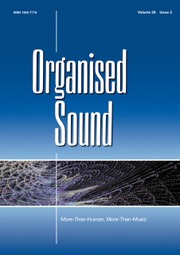No CrossRef data available.
Article contents
Spaces for People: Technology, improvisation and social interaction in the music of Pauline Oliveros
Published online by Cambridge University Press: 09 February 2022
Abstract
The composer Pauline Oliveros emphasised that her music was a by-product of a larger humanistic project aimed at raising awareness and sensitivity through social interaction and community-building. In this article, I highlight the role of technology in facilitating social interaction in improvisatory contexts by considering three examples that span Oliveros’s career: the composition In Memoriam: Nikola Tesla, Cosmic Engineer; her telematic performances; and the Adaptive Use Musical Instrument (AUMI) project. In each of these examples, technological mediation transforms musical and social interaction in unpredictable ways, presenting obstacles that require participants to work cooperatively to resolve them. This intensification of Oliveros’s larger project is considered through several complementary theoretical frameworks, including Don Ihde’s theory of technological mediation, Daniel Belgrad’s concept of deutero-learning in improvisation and Georgina Born’s orders of social mediation in music. By deploying technology in visible – rather than invisible – ways, and by inviting participants to adapt to and even embrace unexpected elements that might otherwise be regarded as limitations, Oliveros’s work reveals how technology can simultaneously be understood as an affordance for music-making and an extension of a deeply social and community-oriented endeavour.
- Type
- Article
- Information
- Organised Sound , Volume 27 , Issue 2: The Sonic and the Electronic in Improvisation, Part 2 , August 2022 , pp. 164 - 171
- Copyright
- © The Author(s), 2022. Published by Cambridge University Press





